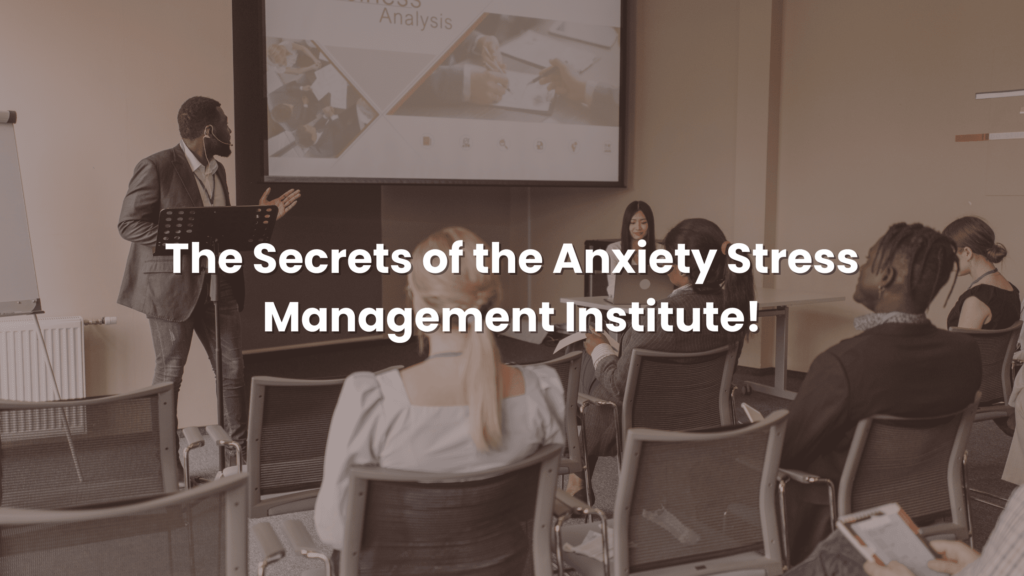Explore the transformative therapies offered at the Anxiety Stress Management Institute. From CBT to mindfulness, discover how we empower individuals to conquer stress and anxiety for a healthier, balanced life.
Table of Contents
What Is Anxiety Stress Management Institute?
The Anxiety Stress Management Institute was founded in 2005 by Dr. Emily Harper, a renowned psychologist with over two decades of experience in mental health care. Driven by a deep understanding of the growing mental health crisis, Dr. Harper envisioned an institution dedicated to providing comprehensive and compassionate care for individuals struggling with anxiety and stress.
From its humble beginnings as a small clinic in downtown San Francisco, the institute quickly grew in response to the increasing demand for specialized mental health services. By 2010, the institute had expanded to a larger facility, incorporating a diverse team of mental health professionals, including psychologists, therapists, and wellness coaches, all committed to a holistic approach to mental health.
Over the years, the institute has become a pioneer in integrating traditional therapeutic techniques with innovative, evidence-based practices. Their programs have been featured in numerous mental health journals and have received accolades for their effectiveness and client-centered approach.
Today, the Anxiety Stress Management Institute is recognized as a leading authority in anxiety and stress management, serving thousands of clients annually and continuously evolving to meet the needs of an ever-changing world.
Mission And Core Values Of The Anxiety Stress Management Institute

Mission
The mission of the Anxiety Stress Management Institute is to empower individuals to lead healthier, more fulfilling lives by providing comprehensive, evidence-based mental health services. The institute is dedicated to alleviating the burden of anxiety and stress through personalized care, innovative treatments, and ongoing support. By fostering a holistic approach to mental health, the institute aims to promote resilience, enhance well-being, and inspire positive change in the lives of those it serves.
Core Values
- Compassion: The institute prioritizes empathy and understanding, ensuring that every individual feels heard, respected, and supported throughout their journey to better mental health.
- Excellence: Committed to delivering the highest standard of care, the institute continually strives for excellence by employing cutting-edge techniques and evidence-based practices in its treatment programs.
- Integrity: Upholding the highest ethical standards, the institute ensures transparency, honesty, and accountability in all interactions and services provided.
- Innovation: Embracing the latest advancements in mental health care, the institute fosters a culture of innovation, continually seeking new and effective ways to treat anxiety and stress.
- Holistic Approach: Recognizing the interconnectedness of mind, body, and spirit, the institute offers a comprehensive range of services that address all aspects of an individual’s well-being.
- Community: The institute values the importance of community and support networks, encouraging collaboration and connection among clients, families, and mental health professionals.
- Empowerment: The institute is dedicated to empowering individuals with the knowledge, skills, and resources they need to take control of their mental health and lead more balanced, fulfilling lives.
Similar: Top 10 Relaxation Techniques for Teens: Find Your Calm!
Qualifications And Expertise Of The Staff At The Anxiety Stress Management Institute

The success of the Anxiety Stress Management Institute is built on the foundation of its highly qualified and experienced staff. Each member of the team brings a unique set of skills and expertise, ensuring that clients receive the best possible care. Here’s a closer look at the qualifications and expertise of the institute’s staff:
Psychologists And Psychiatrists
- Advanced Degrees: All psychologists and psychiatrists at the institute hold advanced degrees (Ph.D., Psy.D., or M.D.) from accredited institutions. Their rigorous academic training equips them with a deep understanding of mental health disorders and treatment modalities.
- Board Certification: Psychiatrists are board-certified in psychiatry, ensuring they meet the highest standards of professional practice.
- Specialized Training: Many staff members have specialized training in anxiety and stress-related disorders, including certifications in cognitive-behavioral therapy (CBT), dialectical behavior therapy (DBT), and mindfulness-based stress reduction (MBSR).
Licensed Therapists and Counselors
- Master’s Degrees: Licensed therapists and counselors possess master’s degrees in clinical psychology, counseling, social work, or related fields.
- Licensure: All therapists and counselors are licensed by the state, signifying their adherence to professional and ethical standards.
- Diverse Specializations: The team includes specialists in various therapeutic approaches, such as family therapy, art therapy, and trauma-informed care, allowing for a comprehensive range of treatment options.
Wellness Coaches and Holistic Practitioners
- Certified Professionals: Wellness coaches and holistic practitioners hold certifications in their respective fields, including yoga instruction, nutrition counseling, and fitness training.
- Holistic Health Training: Many practitioners have extensive training in holistic health practices, emphasizing the integration of mind, body, and spirit in the healing process.
- Experience in Stress Management: These professionals bring practical experience in stress management techniques, ensuring clients benefit from a well-rounded approach to wellness.
Research and Development Team
- Doctorates and Research Expertise: Members of the research team typically hold doctorates in psychology, neuroscience, or related fields, with extensive experience in clinical research.
- Published Authors: Many team members have published research in reputable journals, contributing to the body of knowledge on anxiety and stress management.
- Innovative Research: The team is actively involved in pioneering research projects, continuously seeking new and effective methods for treating anxiety and stress.
Support Staff
- Administrative Excellence: The administrative staff ensures smooth operation and coordination within the institute, holding relevant degrees and certifications in healthcare administration.
- Client-Centered Approach: Support staff members are trained in customer service and client relations, ensuring a welcoming and supportive environment for all clients.
Continuing Education and Professional Development
- Ongoing Training: The institute emphasizes the importance of continuous learning, providing regular opportunities for staff to attend workshops, conferences, and seminars.
- Professional Development: Staff members are encouraged to pursue further certifications and specializations, ensuring they stay current with the latest developments in mental health care.
The collective expertise and dedication of the staff at the Anxiety Stress Management Institute ensure that clients receive the highest quality of care, tailored to their individual needs. This commitment to excellence and innovation positions the institute as a leader in the field of anxiety and stress management.
Types Of Therapy Available At The Anxiety Stress Management Institute

The Anxiety Stress Management Institute offers a wide range of therapeutic approaches to cater to the diverse needs of its clients. Each type of therapy is designed to address different aspects of anxiety and stress, ensuring a comprehensive and personalized treatment plan. Here are some of the key therapies available:
1. Cognitive-Behavioral Therapy (CBT)
- Explanation: CBT is a highly effective, evidence-based therapy that focuses on identifying and changing negative thought patterns and behaviors that contribute to anxiety and stress.
- Approach: Clients work with therapists to recognize distorted thinking, challenge irrational beliefs, and develop healthier ways of thinking and behaving.
- Benefits: CBT helps clients develop practical skills for managing anxiety, reducing stress, and improving overall mental health.
2. Mindfulness-Based Stress Reduction (MBSR)
- Explanation: MBSR combines mindfulness meditation and yoga to help individuals become more aware of their thoughts, feelings, and bodily sensations in the present moment.
- Approach: Through guided meditation, mindful movement, and group discussions, clients learn to reduce stress and improve their emotional regulation.
- Benefits: MBSR has been shown to reduce symptoms of anxiety and depression, enhance well-being, and promote relaxation.
3. Dialectical Behavior Therapy (DBT)
- Explanation: Originally developed for borderline personality disorder, DBT is effective for treating severe anxiety and stress by focusing on emotional regulation, distress tolerance, interpersonal effectiveness, and mindfulness.
- Approach: DBT combines individual therapy with group skills training to help clients manage intense emotions and improve relationships.
- Benefits: DBT equips clients with practical skills to cope with stress, reduce self-destructive behaviors, and enhance their quality of life.
4. Acceptance and Commitment Therapy (ACT)
- Explanation: ACT helps clients to accept their thoughts and feelings, and commit to taking actions that match with their values.
- Approach: Through mindfulness and behavioral changes, clients learn to live in the present moment and engage in meaningful activities.
- Benefits: ACT helps reduce anxiety and stress by promoting psychological flexibility and value-driven living.
5. Exposure Therapy
- Explanation: Exposure therapy is designed to help individuals face and overcome their fears by gradually exposing them to anxiety-provoking situations in a controlled environment.
- Approach: Clients are guided through a hierarchy of fears, starting with less anxiety-provoking situations and gradually working up to more challenging ones.
- Benefits: This therapy is particularly effective for treating phobias, panic disorder, and post-traumatic stress disorder (PTSD).
Take A Look: Can Dehydration Cause High Blood Pressure? Know the Truth!
6. Art Therapy
- Explanation: Art therapy uses creative expression to help individuals explore their emotions, reduce anxiety, and improve their overall mental health.
- Approach: Clients engage in various artistic activities, such as drawing, painting, and sculpting, under the guidance of a trained art therapist.
- Benefits: Art therapy can provide a non-verbal outlet for expressing complex emotions, promote relaxation, and enhance self-awareness.
7. Group Therapy
- Explanation: Group therapy involves multiple clients participating in therapeutic sessions together, providing mutual support and shared experiences.
- Approach: Facilitated by a trained therapist, group sessions focus on specific topics such as anxiety management, stress reduction, and coping skills.
- Benefits: Group therapy offers a sense of community, reduces feelings of isolation, and provides diverse perspectives on coping with anxiety and stress.
8. Family Therapy
- Explanation: Family therapy addresses the dynamics within a family that may contribute to an individual’s anxiety and stress.
- Approach: Therapists work with the entire family to improve communication, resolve conflicts, and build a supportive environment.
- Benefits: Family therapy can enhance relationships, reduce stress, and promote collective healing and understanding.
9. Holistic Therapies
- Explanation: Holistic therapies focus on treating the whole person mind, body, and spirit rather than just the symptoms of anxiety and stress.
- Approach: Techniques such as yoga, tai chi, acupuncture, and nutritional counseling are integrated into treatment plans.
- Benefits: Holistic therapies can improve overall well-being, promote relaxation, and support traditional therapeutic approaches.
The diverse range of therapies available at the Anxiety Stress Management Institute ensures that each client receives a personalized and effective treatment plan tailored to their unique needs and goals.
Success Stories From The Anxiety Stress Management Institute

Testimonial 1: Emma Thompson’s Journey with Cognitive-Behavioral Therapy (CBT)
Emma Thompson’s Story: Emma Thompson, a 25-year-old marketing professional, struggled with chronic anxiety that affected her daily life and work performance. She often experienced panic attacks and had difficulty focusing.
Experience at the Institute: Emma enrolled in a CBT program at the Anxiety Stress Management Institute. Through regular sessions with her therapist, she learned to identify and challenge negative thought patterns and developed practical coping strategies.
Outcome: After six months of CBT, Emma reported a significant reduction in her anxiety levels. She gained confidence in managing her anxiety, leading to improved performance at work and a more balanced personal life.
Emma’s Words: “CBT at the Anxiety Stress Management Institute has been life-changing. I now have the tools to manage my anxiety and live a more fulfilling life. The support and guidance from my therapist were invaluable.”
Testimonial 2: John Miller’s Success with Mindfulness-Based Stress Reduction (MBSR)
John Miller’s Background: John Miller, a 42-year-old teacher, experienced high levels of stress due to his demanding job and personal responsibilities. He often felt overwhelmed and had trouble sleeping.
Therapy Approach: John joined an MBSR program at the institute. The program included guided meditation sessions, mindful movement practices, and group discussions.
Results: Over an eight-week course, John noticed a marked improvement in his stress levels and overall well-being. He developed a regular mindfulness practice that helped him stay calm and focused, even in challenging situations.
John’s Feedback: “The MBSR program taught me how to be present and manage my stress more effectively. It has improved my sleep and overall quality of life. I highly recommend the institute to anyone struggling with stress.”
Testimonial 3: Lisa Johnson’s Relief through Dialectical Behavior Therapy (DBT)
Lisa Johnson’s Challenge: Lisa Johnson, a 30-year-old graphic designer, battled severe anxiety and emotional dysregulation. She found it hard to maintain stable relationships and often felt overwhelmed by her emotions.
Institute’s Intervention: Lisa participated in a DBT program at the institute, which included individual therapy and group skills training sessions.
Transformation: After several months of DBT, Lisa learned skills to regulate her emotions, tolerate distress, and improve her interpersonal relationships. She reported feeling more in control of her life and emotions.
Lisa’s Testimony: “DBT at the Anxiety Stress Management Institute has given me the skills to manage my emotions and improve my relationships. The therapists are compassionate and knowledgeable, and I feel more hopeful about the future.”
Testimonial 4: Michael Anderson’s Progress with Exposure Therapy
Michael Anderson’s Issue: Michael Anderson, a 35-year-old engineer, suffered from social anxiety that prevented him from participating in social events and advancing in his career.
Therapeutic Approach: Michael underwent exposure therapy at the institute. His therapist gradually exposed him to social situations, starting with less anxiety-provoking scenarios and progressively increasing the difficulty.
Achievements: Through systematic exposure, Michael’s social anxiety significantly decreased. He became more comfortable in social settings and was able to engage more confidently with colleagues and friends.
Michael’s Perspective: “The structured approach at the institute helped me face my fears and regain control of my life. I can now enjoy social interactions without overwhelming anxiety.”
These testimonials and case studies illustrate the positive impact of the Anxiety Stress Management Institute’s comprehensive and personalized approach to mental health care. The institute’s dedication to evidence-based therapies and compassionate care has empowered many individuals to overcome their challenges and lead healthier, more fulfilling lives.
How To Enroll In Programs Or Schedule Therapy Sessions At The Anxiety Stress Management Institute
If you’re interested in enrolling in one of the Anxiety Stress Management Institute’s programs or scheduling therapy sessions, follow these simple steps:
Step 1: Visit the Institute’s Website
- Navigate to the Official Website:
- Go to the Anxiety Stress Management Institute’s official website. This is the primary resource for information about the institute’s programs, therapists, and contact details.
Step 2: Explore the Programs and Services
- Browse Available Programs:
- Explore the various programs and therapy options available. These may include Cognitive-Behavioral Therapy (CBT), Mindfulness-Based Stress Reduction (MBSR), Dialectical Behavior Therapy (DBT), Exposure Therapy, and more.
- Read through the descriptions to find the program that best suits your needs.
Step 3: Contact the Institute
- Reach Out for More Information:
- If you have any questions or need more information about a specific program, contact the institute. There are typically multiple ways to get in touch:
- Phone: Call the institute directly using the contact number provided on the website.
- Email: Send an email inquiry to the institute’s official email address.
- Contact Form: Fill out the online contact form available on the website.
- If you have any questions or need more information about a specific program, contact the institute. There are typically multiple ways to get in touch:
Step 4: Initial Consultation
- Schedule an Initial Consultation:
- Many therapy programs begin with an initial consultation. This helps the institute understand your specific needs and recommend the best course of action.
- You can usually schedule this consultation online or by calling the institute.
Step 5: Enroll in a Program
- Program Enrollment:
- Once you’ve had your initial consultation, the next step is to enroll in the recommended program. The institute’s staff will guide you through the enrollment process.
- You may need to fill out some forms, provide relevant medical history, and discuss any specific concerns or goals.
Step 6: Schedule Therapy Sessions
- Setting Up Therapy Sessions:
- After enrollment, schedule your therapy sessions. The frequency and duration of sessions will depend on the program and your individual needs.
- Sessions can often be scheduled through an online portal, by phone, or in person at the institute.
Step 7: Prepare for Your Sessions
- Prepare for Your First Session:
- Gather any necessary documents or information requested by your therapist.
- Make note of any questions or topics you want to discuss during your sessions.
Step 8: Attend Your Sessions
- Participate Actively:
- Attend your sessions regularly and actively participate in the therapy process.
- Follow any guidance or exercises provided by your therapist to get the most out of your program.
Step 9: Monitor Progress
- Track Your Progress:
- Regularly assess your progress with your therapist. Adjustments to the program can be made based on your needs and improvements.
Step 10: Continue Support
- Ongoing Support:
- Even after completing a program, continue to utilize the support and resources available at the institute.
- Participate in follow-up sessions or join support groups if recommended by your therapist.
Epilogue
Navigating stress and anxiety can be a challenging journey, but the Anxiety Stress Management Institute stands as a beacon of hope and support for those seeking relief. Through a blend of evidence-based therapies, compassionate care, and tailored programs, our institute is dedicated to empowering individuals to overcome their mental health challenges and achieve a sense of calm and well-being.
From Cognitive-Behavioral Therapy (CBT) to Mindfulness-Based Stress Reduction (MBSR) and more, our diverse range of therapeutic approaches is designed to meet the unique needs of each client. We believe in fostering a nurturing environment where healing can flourish, guided by experienced professionals who are committed to your mental health journey.
Whether you’re facing overwhelming stress, anxiety disorders, or seeking personal growth, our institute offers the tools and support you need to thrive. Take the first step towards a brighter tomorrow by reaching out to us today. Discover the transformative power of our programs and embark on a path towards a healthier, more balanced life.
For more information on our services, programs, and how to get started, visit our website, give us a call, or send us an email.









